
Functions of Language
Scope & Guideline
Fostering Scholarly Dialogue in Linguistic Functions
Introduction
Aims and Scopes
- Systemic Functional Linguistics (SFL):
The journal extensively covers research related to systemic functional linguistics, analyzing how language structures serve specific communicative functions in varied contexts. - Cross-linguistic and Multilingual Studies:
It explores linguistic phenomena across different languages, highlighting comparative studies that reveal universal patterns and language-specific features. - Pragmatics and Discourse Analysis:
The journal emphasizes pragmatic aspects of language, examining how contextual factors shape meaning and interaction in discourse. - Multimodal Communication:
Research on multimodal aspects of communication, integrating visual, auditory, and textual modes, is a key focus, reflecting the complexity of real-life communication. - Cognitive Approaches to Language:
The journal incorporates cognitive perspectives, investigating how language relates to thought processes and embodied cognition. - Language Acquisition and Development:
Studies on language acquisition, particularly in multilingual contexts and among young learners, are frequently published, showcasing developmental aspects of language use. - Historical and Diachronic Linguistics:
It includes research that examines historical changes in language use and structure, providing insights into the evolution of linguistic forms and functions.
Trending and Emerging
- Evidentiality and Modalities:
Recent publications show a significant increase in studies focusing on evidentiality and the function of modal expressions, highlighting their role in constructing meaning and conveying speaker attitudes. - Multimodal Pragmatics:
There is a growing emphasis on multimodal pragmatics, exploring how different modes of communication (e.g., visual, auditory) interact to shape discourse and understanding. - Cognitive Linguistics:
Research integrating cognitive theories with linguistic analysis is on the rise, reflecting an interest in how language shapes and is shaped by cognitive processes. - Discourse Markers and Their Functions:
A notable trend is the exploration of discourse markers, their functions, and their role in structuring conversation and text, revealing insights into conversational dynamics. - Contextualization in Language Use:
Emerging studies focus on the role of context in language use, particularly in computer-mediated communication, demonstrating the relevance of situational factors in linguistic analysis. - Language and Social Semiotics:
There is an increasing interest in the intersection of language and social semiotics, examining how linguistic choices reflect and construct social meanings and ideologies.
Declining or Waning
- Traditional Syntax:
Research focusing on traditional syntactic structures and rules has become less frequent, as the journal increasingly favors functional and pragmatic analyses over purely syntactic ones. - Static Models of Language:
There is a noticeable decrease in the publication of studies employing static models of language that do not account for the dynamic and contextual nature of language use. - Isolated Language Features:
Papers that analyze isolated features of language without situating them in broader communicative or functional contexts are becoming less common, as the journal shifts towards integrative approaches. - Descriptive Linguistics without Functional Analysis:
There appears to be a waning interest in purely descriptive linguistic studies that do not engage with functional or pragmatic implications, reflecting a shift towards more applied research.
Similar Journals
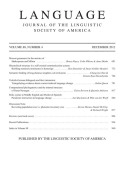
LANGUAGE
Fostering Innovation in Linguistic ResearchLANGUAGE, published by the Linguistic Society of America, is a premier academic journal dedicated to the rigorous study of linguistic theory and practice. With an ISSN of 0097-8507 and E-ISSN 1535-0665, this esteemed journal has established itself as a leading publication in the field of linguistics since its inception. The journal has consistently maintained a high impact factor, being ranked in the Q1 category in Linguistics and Language for 2023, placing it among the top tier of academic journals. Notably, it also holds impressive Scopus rankings, being positioned at #75 out of 1088 in Arts and Humanities, and #89 out of 1167 in Social Sciences, demonstrating a significant impact and reach in the discipline. While it is not an open-access journal, LANGUAGE provides crucial insights into linguistic research, fostering a vibrant academic community. Spanning years from 1996 to 2024, it continues to be an essential resource for researchers, professionals, and students alike, aiming to advance the understanding of language in its myriad forms and functions.
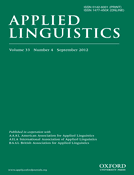
APPLIED LINGUISTICS
Championing Rigorous Research in Language AcquisitionApplied Linguistics, published by Oxford University Press, is a premier scholarly journal that has significantly contributed to the fields of linguistics and communication since its inception in 1980. With an impressive impact factor and ranked in the top quartile (Q1) in both Communication and Linguistics and Language categories, Applied Linguistics is recognized for its rigorous peer-reviewed articles that explore the intersections of language, society, and cognition. The journal enjoys a remarkable position in the Scopus rankings, placing it among the top 2% of publications in its discipline. Researchers, professionals, and students benefit from its comprehensive scope, which encompasses innovative research on language acquisition, discourse analysis, and applied linguistics methodologies. Although not an open access journal, its commitment to advancing knowledge and fostering academic discussions makes it an indispensable resource for anyone interested in the critical role of language in various contexts.
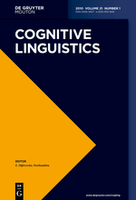
COGNITIVE LINGUISTICS
Advancing Understanding of Cognitive Connections.COGNITIVE LINGUISTICS, published by De Gruyter Mouton, is a premier academic journal dedicated to advancing the field of cognitive linguistics and its interconnections with psychology and language studies. With an impressive impact factor and a ranking in the Q1 category for Linguistics and Language, as well as Q2 in Developmental and Educational Psychology according to 2023 metrics, this journal demonstrates its significance in fostering scholarly discourse and innovation. The journal's rigorous peer-reviewed approach ensures that only high-quality research is shared with its audience, including professionals, researchers, and students keen on exploring the cognitive aspects of language. Since its inception in 1990, COGNITIVE LINGUISTICS has been a vital platform for disseminating cutting-edge studies, making it an invaluable resource for anyone interested in the intersections of cognitive science and linguistics.

Contrastive Pragmatics
Fostering collaboration across languages and cultures.Contrastive Pragmatics, published by BRILL, is a premier open-access journal dedicated to advancing the field of linguistics through a unique focus on the pragmatic aspects of language comparison and contrast. Since its inception in 2020, this journal has rapidly established itself as a vital resource for scholars interested in the intricate interplay between language use, culture, and communication, reflecting the increasing importance of pragmatics in understanding cross-linguistic phenomena. With its Q2 ranking in Linguistics and Language as of 2023, and its commendable positions within Scopus ranks, Contrastive Pragmatics offers a platform for innovative research that not only highlights theoretical developments but also invites empirical investigations across languages and cultures. The journal's commitment to open access ensures that cutting-edge research is freely available, fostering collaboration and knowledge sharing among researchers, professionals, and students alike. For those looking to stay at the forefront of linguistic research, Contrastive Pragmatics is an essential avenue for exploration.

Russian Journal of Linguistics
Unlocking the Rich Tapestry of Language StudiesWelcome to the Russian Journal of Linguistics, a prestigious journal published by Peoples Friendship University of Russia that has made significant strides in the realm of linguistic studies since its inception. With an Open Access policy established in 2019, this journal provides unparalleled opportunities for researchers, professionals, and students to share and disseminate groundbreaking linguistic research. The journal is currently ranked in the Q1 category for Linguistics and Language and boasts impressive Scopus rankings, placing 129th out of 1088 in the Arts and Humanities, and 148th out of 1167 in the Social Sciences. Focusing on a diverse range of linguistics topics, the journal aims to facilitate cross-disciplinary dialogue and foster advancements in the study of language. Located in Moscow, Russia, it champions the vibrant linguistic community by consistently publishing high-quality research that contributes to the global understanding of language dynamics. We invite you to explore the wealth of knowledge and insight the Russian Journal of Linguistics has to offer.
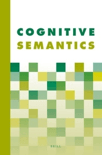
Cognitive Semantics
Illuminating the Cognitive Foundations of MeaningCognitive Semantics, published by BRILL, is a leading academic journal dedicated to the intricate study of cognitive processes underlying language use and semantic meaning. With its ISSN 2352-6408 and E-ISSN 2352-6416, this journal contributes significantly to the fields of linguistics and language studies, reflecting its importance in contemporary research on cognitive linguistics. Over its publication span from 2015 to 2024, it has established a niche as a Q3 ranked journal in the Linguistics and Language category for 2023, showcasing its relevance and growing influence in the academic community. Although currently not open access, the journal aims to provide a robust platform for exchanging ideas, theories, and methodologies related to cognitive semantics, fostering interdisciplinary dialogue among researchers, professionals, and students. Readers can expect to uncover valuable insights into the cognitive mechanisms that shape our understanding of language, making this journal an essential resource for anyone involved in linguistic research.
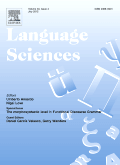
LANGUAGE SCIENCES
Advancing Knowledge in Language and CognitionLANGUAGE SCIENCES, published by Elsevier Science Ltd, stands as a prominent journal in the field of linguistics and language studies. With an impressive impact factor that solidifies its reputation, it holds a Q1 ranking in both the linguistics and language categories for 2023, reflecting its excellence and relevance in cutting-edge research. Since its inception in 1979, this journal has evolved to encompass a wide range of interdisciplinary studies, providing a platform for innovative research that addresses the complexities of language use, acquisition, cognition, and social interactions. The journal is hosted in the United Kingdom and features rigorous peer-reviewed articles that contribute significantly to both the academic community and practical applications in language-related fields. With access options tailored for a diverse range of readers and contributors, LANGUAGE SCIENCES invites scholars, students, and professionals to engage with its comprehensive body of work and contribute to the ongoing discourse in linguistics.
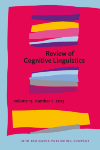
Review of Cognitive Linguistics
Innovating Perspectives in Cognitive Approaches to LanguageThe Review of Cognitive Linguistics, published by John Benjamins Publishing Co, is a premier academic journal dedicated to the exploration of cognitive approaches to linguistics. With an ISSN of 1877-9751 and E-ISSN 1877-976X, this journal provides a critical platform for researchers and professionals to disseminate their findings in the rapidly evolving fields of linguistics and language, alongside developmental and educational psychology. Hailing from the Netherlands, the journal boasts impressive standing within the academic community, as indicated by its 2023 Q1 ranking in Linguistics and Language and Q3 in Developmental and Educational Psychology. Additionally, its Scopus rankings reflect a strong position within the arts and humanities and social sciences categories. While currently operating under a traditional access model, this journal actively contributes to the overarching discourse within cognitive linguistics, and is a vital resource for those aiming to deepen their understanding of the intricate link between language and cognition. Researchers, educators, and students are encouraged to engage with the rich body of articles spanning its convergence years from 2010 to 2024, making it an essential read for those at the forefront of these interdisciplinary studies.
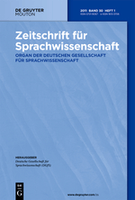
Zeitschrift fur Sprachwissenschaft
Fostering interdisciplinary insights into the world of linguistics.Zeitschrift für Sprachwissenschaft, published by DE GRUYTER MOUTON, is a leading journal in the field of linguistics that has been contributing to scholarly discourse since its inception in 1982. With an ISSN of 0721-9067 and an E-ISSN of 1613-3706, the journal offers an Open Access model since 2017, ensuring widespread dissemination of research findings. Positioned in Q2 of the Linguistics and Language category for 2023, it ranks #312 out of 1088 in the Arts and Humanities and #370 out of 1167 in Social Sciences, reflecting its robust impact and contribution to the field. This German-based journal covers a diverse range of topics related to language and linguistics, appealing to researchers, professionals, and students alike. By fostering interdisciplinary dialogue and showcasing innovative research, Zeitschrift für Sprachwissenschaft plays a critical role in advancing our understanding of language in various contexts. The journal is located at Genthiner Strasse 13, 10785 Berlin, Germany, inviting scholars globally to contribute to its mission of enhancing linguistics research.
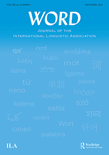
WORD-JOURNAL OF THE INTERNATIONAL LINGUISTIC ASSOCIATION
Advancing linguistic scholarship for a global audience.WORD-JOURNAL OF THE INTERNATIONAL LINGUISTIC ASSOCIATION is a leading peer-reviewed journal dedicated to advancing the field of linguistics and language studies. Published by Routledge Journals, Taylor & Francis Ltd, this esteemed journal has earned a reputation for its rigorous scholarship, reflected in its 2023 Q2 ranking in Linguistics and Language and its solid performance in Scopus Ranks. Encompassing a wide range of topics—from theoretical frameworks to empirical research—WORD serves as an essential resource for linguistics researchers, educators, and students alike. While currently not operating under an open access model, the journal is committed to providing high-quality, impactful research articles that contribute significantly to the linguistic community. With its convergence periods from 1998 to 2009 and 2015 to 2024, WORD continuously fosters the discourse of language studies, ensuring that critical insights and discussions are accessible for ongoing academic exploration.